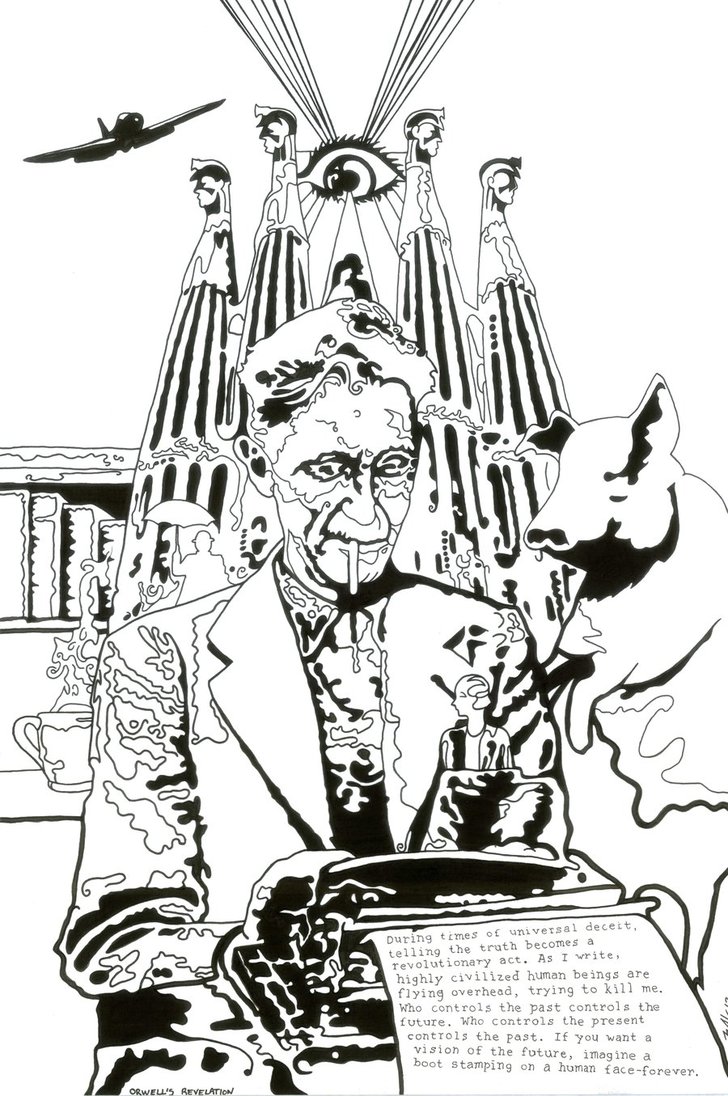 A swelling interest in George Orwell, in a swelling Orwellian age of WikiLeaks and worldwide mega- surveillance — art imitating life, and life becoming a movie.
A swelling interest in George Orwell, in a swelling Orwellian age of WikiLeaks and worldwide mega- surveillance — art imitating life, and life becoming a movie.
Robert Butler at Intelligent Life magazine reviews the literature of a cultural, social motif for an age, “1984,” a tale of the times, from Orwell’s literary executor Bill Hamilton: ‘“We’re selling far more. We’re licensing far more stage productions than we’ve ever done before. We’re selling in new languages—Breton, Friuli, Occitan. We’ve recently done our first Kurdish deals too…”‘
Further: ‘A new Hollywood movie of “1984” is in the pipeline, “Animal Farm” is also in development as a feature film, and Lee Hall, who wrote “Billy Elliot”, is writing both a stage musical version of “Animal Farm” and a television adaptation of “Down and Out in London and Paris”. It’s boom time for Orwell: “total income,” Hamilton says, “has grown 10 percent a year for the last three years.”‘
An awful case of massive irony.
(Illustration found here).
Maybe not irony in the true sense, though, the presence of technology in just about everybody’s tiny little fist makes inevitable surveillance as a factor of modern life.
Butler continues:
It wasn’t the horror of the two planes going into the twin towers: it was the fear and paranoia that followed.
When George Bush first heard about the attacks, he had been reading a story to children in an elementary school in Florida and he went on and finished the task in hand.
After that exemplary display of statesmanship, things deteriorated.
As the novelist Andrew O’Hagan wrote recently, “9/11 unleashed terrible furies in the minds of America and its allies…it literally drove the security agencies and their leaders mad with the wish to become all-knowing.”
With his “war on terror”, Bush made the mistake — which Orwell would have eviscerated him for — of picking a fight with an abstract noun.
Then came rendition, Guantánamo, waterboarding and the industrial-scale expansion of homeland security.
“In the past”, we’re told in “1984”, “no government had the power to keep its citizens under constant surveillance.”
Now the FBI can activate the camera on a laptop without the light going on to alert the user.
…
To Edward Snowden, the technologies that Orwell depicts “now seem quaint and unimaginative”.
He told the Guardian’s editor, Alan Rusbridger, “Now we’ve got webcams that go with us everywhere. We actually buy cellphones that are the equivalent of a network microphone that we carry around in our pockets voluntarily. Times have shown that the world is much more unpredictable and dangerous.”
But the general public, on learning of something like Snowden’s revelations, still goes out and buys Orwell.
Even though there are many editions of “1984” to choose from, after Snowden went public, Bloomberg News reported that in America a single edition of the book had moved from 11,855th on Amazon’s Movers and Shakers list to number three.
And the general public, on hearing Snowden’s revelations and reading or re-reading “1984”, still happily release unprecedented amounts of information about their private lives through social media, search engines and GPS trackers.
Read the whole article — remarkable age we inhabit whether we like it or not.
(h/t The Dish).